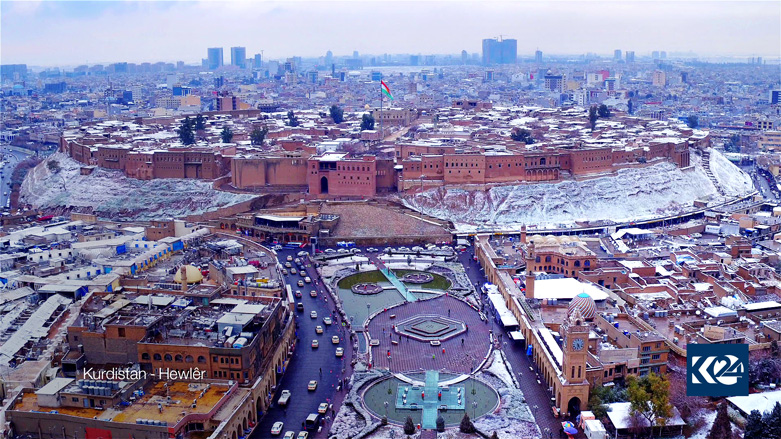Cheney Advisor: US relations with Erbil are model for what ties with Baghdad should be

WASHINGTON DC (Kurdistan 24) – Last week, just before the first session of the “Strategic Dialogue” between the US and Iraq, John Hannah, National Security Advisor to Vice-President Dick Cheney during the George W. Bush administration, shared his thinking about the issue with Kurdistan 24.
Hannah, who is now a senior counselor at the Foundation for Defense of Democracies, expressed his frustration with the state of US-Iraqi relations, but also his hopefulness that it could be set right, with the new government of Mustafa al-Kadhimi.
Notably, Hannah cited US relations with the Kurdistan Region as a model for how US ties with Iraq should be.
“We know we have a real partner in Erbil,” he said. “We know that the Peshmerga,” as well as the government and people of the Kurdistan Region, “actually welcome and support the United States’ presence in Kurdistan and cooperation with the United States against all the array of challenges and threats that we face in the region.”
“We need that same kind of partnership to be shown in Baghdad for us to be able to move forward,” Hannah states.
Other US officials and former officials have expressed a similar sentiment. Late last year, Joey Hood, Principal Deputy Assistant Secretary in the State Department’s Bureau of Near Eastern Affairs, told Kurdistan 24, “The Kurdistan Region could serve as a model for the rest of Iraq,” in terms of economic policy and attracting foreign investment.
Lt. Gen. Jay Garner, US Army (Ret.), who oversaw Operation Provide Comfort in 1991 and initially led the US effort at Iraqi reconstruction in 2003, put it more broadly, “Kurdish Iraq is the Iraq we wanted to have. Kurdistan is what we wanted Iraq to be.”
Iraq Needs the US more than the US Needs Iraq
Hannah expressed what is probably a more widely held frustration about Iraq within the Trump administration.
Iraq has real, very acute needs. The global lockdowns precipitated by the coronavirus pandemic have caused oil prices to collapse, leading to “one of the worst economic crises in Iraq’s history,” Hannah noted.
“Iraq needs US dollars to support and prop up its currency and to engage with the international community,” he said, adding that it also “needs waivers from the United States to be able to import electricity and gas from Iran.”
Iraq also needs US military support. Referring to the non-binding resolution of Iraq’s National Assembly which called for the expulsion of US forces, Hannah said, “America will survive without troops in Iraq,” but “I’m not sure Iraq can survive.”
“I think there’s a will in the United States to help this new prime minister,” he stated, but “for us to be able to address his concerns—to help him on his economy; to help continue like we want against ISIS; to help stabilize Iraq, we do need this Iraqi government to take some minimal steps to actually reinforce its sovereignty”—that is, to act independently of Tehran—and create “confidence in the United States that we still have a real partner in Baghdad in the same way” that “we know we have a real partner in Erbil.”
It is neither an acceptable position or a sustainable one to have Americans “helping Baghdad with the counter-terrorism problem that’s coming out of Syria and out of parts of western Iraq,” Hannah explained, “when from eastern Iraq, we’re being attacked from our rear by Iraqi parties that are supposed to be beholden” to Iraq’s Commander-in-Chief, “but, in fact, are getting instructions from a foreign power to the east.”
Hannah stressed that what the US was asking from Iraq was neither radical nor unreasonable. “Nobody believes Iraq ought to stop all economic and diplomatic and security relations with Iran.”
However, when a military force in Iraq, at the invitation of the Iraqi government is “attacked by forces inside Iraq who are violating the orders of the Iraqi Commander-in-Chief,” then “those groups [should be] punished,” he stated.
Hannah also explained that the US expected Baghdad to treat its citizens fairly and not brutalize them—not “shooting them in the head with tear gas canisters” and “disappearing its young people from the streets.”
Rather, they should be engaged and the effort made to “channel this very important movement of young people into normal politics, into new elections” and provide them “hope for a better future and a sovereign homeland.”
What if that is not possible? Plan B? Plan C?
If those “minimal conditions” cannot be met, “I think the United States is going to have to conduct a real, hard strategic review of our position in Iraq,” Hannah said.
“Then, I think, the United States will begin to have to start looking at Plan B and Plan C on how we might achieve some of our objectives in that part of the world, particularly in terms of fighting ISIS and supporting our friends in the Kurdistan Region that we prefer not to have to look at, because they create a whole new host of problems.”
“But if Baghdad leaves us no other choice, then I think continuing to be in Iraq the way that we’ve been there the last several years,” he said, suggesting it was unsustainable. “The commitment to expending more troops, more blood, more treasure on behalf of a government in Baghdad that refuses to act like a real partner of the United States, that it’s only a responsible thing for any American government to review that policy and that commitment” and “begin looking at alternatives.”
Editing by John J. Catherine
